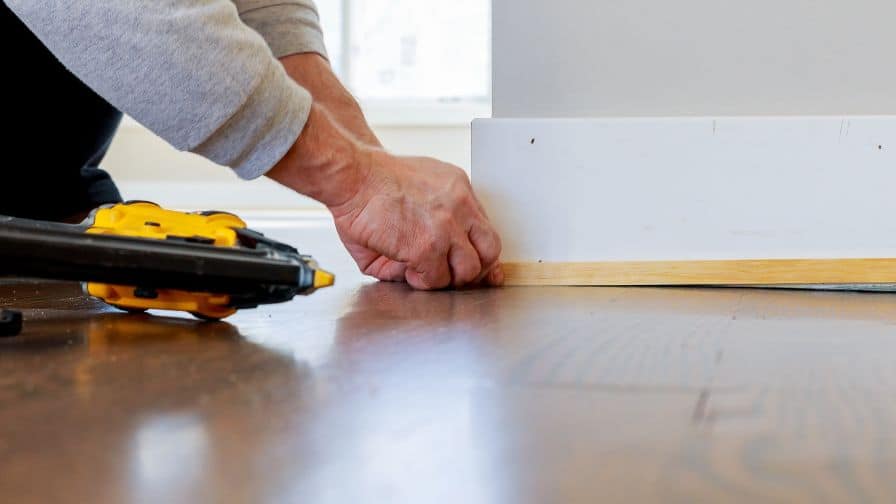
When it comes to finish nailers, there are two main gauges you will find on the market: 15 gauge and 16 gauge. So which one is better? In this blog post, we will discuss the pros and cons of each gauge and help you decide which one is best for your needs.
Overview Of 15 And 16 Gauge Finish Nailers
If you’re looking for a finish nailer, deciding between 15 and 16 gauge might be daunting. But with the right information, it doesn’t need to be so difficult.
16-gauge nailers are shooting nails slightly thinner as compared to that of the 15-gauge and has smaller heads. Depending on the brand, 16-gauge nailers are shooting nails that are from 3/4” to 2-1/2” inches long. And they also provide good holding power and make great general-use guns.
On the other hand, 15-gauge nailers shoot a thicker nail between 1-1/4” to 2-1/2” long. They have substantial holding power thanks to the heavier head and are ideal for harder woods.
Whether you’re a professional contractor or a DIY enthusiast, choosing the right nailer for your project is essential to ensure that your job turns out correctly. Consider 15 and 16-gauge finish nailers when making your decision – you won’t be disappointed!
Which Is Better 15 Or 16 Gauge Finish Nailer?
When it comes to finish nailers, the debate over which gauge is better—15 or 16—can be heated. Each has its advantages, so let’s take a look at what you should consider when making your choice.
The 15 gauge finish nailer is a heavy-duty option and is great for larger, denser woods and doors. The thicker nails are tough to drive into the wood and provide plenty of stability. On the downside, they leave large holes when removed, so if you’re working on delicate projects, this isn’t the best choice for you.
Meanwhile, the 16 gauge finish nailer is more suitable for thinner wood and delicate moldings. The smaller nails are easier to drive and leave a much smaller hole when removed. It can easily split small moldings due to the power of the nailer, so use caution when nailing delicate projects.
At the end of the day, it comes down to your specific needs. If you’re working on larger projects that need added stability, the 15 gauge finish nailer is your best bet. But if you’re doing delicate work that could be easily damaged by large holes, the 16 gauge finish would be the better choice. So make sure you know exactly what you need before making a decision.
15 Gauge Finish Nailer vs 16 Gauge Finish Nailer – What`s The Difference?
Subscribe to MyToolkit | Stapling & Nailing Ltd
A 15-gauge nailer uses nails thicker than a 16-gauge and they have larger heads. The 15 gauge finish nailer is great for heavier projects like framing or anything that requires more power. But if you are working with thinner materials, delicate moldings or need a smaller head that will fill the hole, then a 16 gauge nailer could be a better option.
So it all comes down to what type of project you have and the thickness of the materials you are working with. Ultimately, it’s about finding the right combination for your specific job.
When Would You Use A 16 Gauge Finish Nailer?
It is recommended to use a 16 gauge finish nailer for smaller carpentry work, like trim or casings. The 16 gauge is thinner than the 15 gauge and ideal for those delicate molding projects where you don’t want a big nail head to show. It’s also great for thin wood, as it won’t split the wood as easily as a larger nail. However, for heavier jobs like framing or installing baseboards and decking, the 15 gauge finish nailer is your best bet. It’s sturdier than the 16 gauge and will hold better in thicker wood. With either option though, you’ll get a nice finished look with minimal effort.
What Is A 15 Gauge Finish Nailer Used For?
A 15 gauge finish nailer is a type of nail gun used for precision nailing in woodworking projects. Here are projects that can be made easier with the use of a 15 gauge finish nailer:
Cabinet: Cabinets often have intricate details that require precise and even nailing. A 15 gauge finish nailer is ideal for these types of projects, as it’s able to shoot fine nails from 1-2″ in length at an angle – perfect for attaching molding and trim to cabinets without marring the surface.
Furniture: Assembling furniture requires a lot of nailing, from attaching legs to frames to upholstering. A 15 gauge finish nailer is a perfect tool for fastening these types of joints securely and precisely.
Trim and Molding Installation: Installing trim and molding requires precision nailing to ensure that all pieces fit together perfectly, and a 15 gauge finish nailer is up to the task. It can shoot nails depending on what type of trim or molding you’re installing, ensuring that everything is secured tightly and evenly.
Upholstery Trim: Upholstering furniture often requires tacking fabric down with small finishing nails. A 15 gauge finish nailer is an ideal tool for this type of job, as it shoots clean and precise nails that won’t tear or damage the fabric.
Whether you’re a professional woodworker or just starting out, a 15 gauge finish nailer is an invaluable tool to have in your workshop. It’s the perfect tool for precision nailing in cabinet and furniture building, trim and molding installation, and upholstery trim applications. With a 15 gauge finish nailer in your toolbox, you’ll be able to tackle any woodworking project with ease.
What Gauge Nail Is Best For Finish Work?
Subscribe to Pro Tool Reviews
No matter what type of finish work you’re doing, it’s important to know which gauge nail will give the best results. The 15 gauge nailer is great for heavier jobs like hardwoods or thicker trim work. If you need finer detail and a smaller nail head, then the 16 gauge nailer is probably the better choice.
Consider the thickness of the wood and the type of finish you’re doing when making your choice. This will ensure that you get a professional, polished look. And no matter which nailer you use, always remember to practice safety first!
Advantages Of Using A 15 Gauge Finish Nailer
Using a 15 gauge finish nailer has many advantages when it comes to completing your projects. These nailers are powerful, and able to drive nails into even the toughest of woods with ease. The angled magazine design also gives you much better access to tight spaces than traditional straight magazines, making them an ideal choice for doorjambs or stair treads. With a large piston, these nailers provide more power and drive nails much deeper than their smaller counterparts. The extra power also makes them great for tasks like nailing baseboards or crown molding onto hardwood floors.
Disadvantages Of Using A 15 Gauge Finish Nailer
Using a 15 gauge finish nailer has some drawbacks that you should consider before deciding if it’s the right tool for your project. Because these nails are slightly larger than those used in other types of nailers, they can easily split or crack thinner boards. The smaller heads on the 15 gauge nails can also make them difficult to remove once they are in place. This can be a real issue if you need to replace a board or make adjustments during the project.
And, because of their size and shape, these nails don’t hold as securely as other types of nails. So if you’re looking for a nailer that will give your project an extra bit of holding power, a 15 gauge finish nailer may not be the best choice. Another potential problem is that these nails can sometimes miss the mark when they are fired and end up sticking out at an angle or crooked.
To avoid this, take your time to make sure you’re nailing in straight lines and driving the nails into the wood where they belong. In the end, while a 15 gauge finish nailer can be a great tool for certain projects, make sure you weigh the pros and cons before deciding if it’s right for your project.
Advantages Of Using A 16 Gauge Finish Nailer
Subscribe to Mr FIXIT
Using a 16 gauge finish nailer brings a number of advantages to your home projects. First, the nails used are thinner than 15-gauge nails and have smaller heads, so you can use them for finer trim work. Depending on the brand, these can shoot nails from 3/4” to 2-1/2” inches long, giving you a wide range of options for your projects. The nails also have good holding power, making them a great option for general use in your home. Finally, the nailer is lightweight and easy to maneuver around tight spots, so you can get your projects completed without fatigue or strain. All these advantages make the 16 gauge finish nailer a great tool for your home projects.
Disadvantages Of Using A 16 Gauge Finish Nailer
The disadvantages of using a 16 gauge finish nailer are not limited to splitting moldings, but also in precision. While a 16 Gauge Finish Nailer is powerful enough for most jobs, it can sometimes be too powerful and drive nails deeper than intended in smaller projects. This can lead to the nails being difficult or impossible to remove if needed later on which can cause frustration and time spent correcting mistakes.
Overall, a 16 Gauge Finish Nailer can be a great tool for many applications, but it is important to keep in mind the potential disadvantages of using one. It’s always smart to take extra care when nailing pieces together to ensure that everything goes as planned and your project looks as good as possible. If you take the time to understand the tools you are working with, you’ll get better results every time!
Final Thoughts On Which Is Better -15 Or 16-Gauge Finish Nailers
When it comes down to choosing between a 15 or 16-gauge finish nailer, the decision really depends on what type of job you’re doing. If you need to do more demanding projects like nailing doorjambs then I would recommend using a 15-gauge nailer. Its thicker and heavier head provides a stronger hold than the 16 gauge. However, if you’re doing more general-use jobs then the 16-gauge nailer is a perfectly suitable option. No matter which one you choose, it’s important to make sure that you are using the proper safety measures when using your finish nailer. Good luck with all of your projects!



